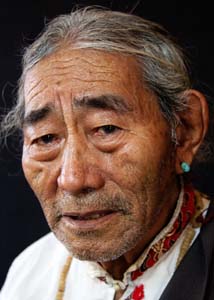Name: Tsewang Namgyal
(Alias: No)
Gender: Male
Interview Age: 87
Date of Birth: 1927
Birthplace: Hapchen, Utsang, Tibet
Year Left Tibet: 1960
Profession: Servant
Monk/Nun: No
Political Prisoner: No

Interview No.: 11B
Date: 2014-01-04
Language: Tibetan
Location: Lugsung Samdupling Settlement, Bylakuppe, Karnataka, India
Categories: Chinese Invasion and Occupation, Culture and History
Keywords: childhood memories, Chinese -- oppression under, environment/wildlife, escape experiences, herding, monasteries -- destruction of , nomadic life, servitude, taxes, thamzing/struggle sessions, Utsang
Summary:
Tsewang Namgyal was born into a middle class nomad family with six children. They reared animals such as yaks, dri 'female yak,' sheep and horses. He describes the large number of animals, the grass-covered mountains, availability of good water and the rocky mountains. He says that milk products like butter, curd and cheese were consumed and bartered for rice, wheat flour and grains. The also used milk products and wool to pay taxes once a year to the local monastery. Tsewang Namgyal describes the taxes and how it could be a burden to nomads.
After his parents' death Tsewang Namgyal became a servant to a local wealthy family, but was treated well. He recounts his escape to Nepal after hearing from travelers about the suffering being inflicted by the Chinese in far away regions. The nomads attempted to drive their animals to Nepal but could not find grass during wintertime, which led to the death of the nomads' herds and they were reduced to beggars.
While in Nepal Tsewang Namgyal was informed that the wealthy family for whom he had worked was subjected to thamzing 'struggle sessions' and their riches distributed to all the villagers. So he secretly visited his village and learned about the repressive policies, destruction of shrines and burning of scriptures which had occurred under the Chinese occupation.
Interview Team:
- Marcella Adamski (Interviewer)
- Tenzin Yangchen (Interpreter)
- Pema Tashi (Videographer)

